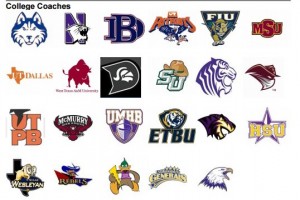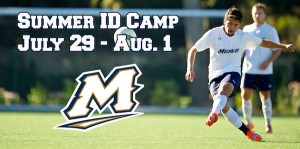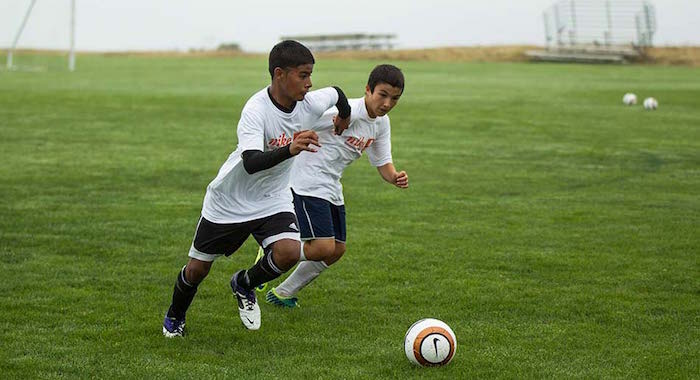If you're a high school soccer player with the goal of playing college soccer, you're going to want to attend college ID camps this summer. Because of
If you’re a high school soccer player with the goal of playing college soccer, you’re going to want to attend college ID camps this summer. Because of Covid-19, we have yet to see what the world will look like over the next few months, but ID camps are likely to return to the college recruiting world over the summer.
There are a lot from which to choose. How do you pick which camps will be best for you (and for your family’s budget)? Here are some tips for deciding which camps will be best for you.
 MULTI-SCHOOL camps:
MULTI-SCHOOL camps:
Quite a few companies exist that bring together impressive lists of college coaches for camps at a single facility. You’re probably already on their mass email lists. Sometimes a camp is on a college campus, sometimes it’s at a park or soccer facility. The no-nonsense truth about these camps is that the main benefit will be the soccer training you will receive, NOT the recruiting exposure.
If you have your heart set on a certain college, and that college coach will be at that camp, and if this is the ONLY way for you to play in front of that coach, attend the camp. Be absolutely sure to contact that coach before the camp to communicate your interest in their program. You may not get a lot of time in front of that coach at the camp, so you need to make the most of this opportunity if you want to use the camp as a recruiting tool. The camp may also include recruiting talks and discussions about the life of college soccer athletes. Those can be beneficial as well, but most college camps include these talks, plus your club DOCs and recruiting coordinators will also be sources of the same information. Is attending one of these camps worth your time and money? Only you and your family can answer that question.
 SINGLE-SCHOOL camps:
SINGLE-SCHOOL camps:
Over the last few years, a trend has been gaining strength, particularly on the men’s side: More and more coaches are relying on their own ID camps as a main recruiting tool. College coaches will plan ID camps at their own schools’ facilities. A coach will see a promising recruit at a tournament or showcase, and immediately follow up with a request that the athlete attend an upcoming ID camp.
It’s true that these camps are partially used for fund-raising for the soccer program. That is especially true for multi-day youth camps and multi-day residential camps, but it is not as true for a single-day ID camp on campus. The coach wants to see how a player responds to his/her coaching style. He/She will have current players working at the camp with specific instructions to engage recruits so that reports can get back to the coach about the recruits’ personalities and demeanor on and off the soccer field. Players will gain valuable training as well as insight into that school’s soccer program and campus.
Many one-day ID camps also involve tours of the campus, meals in the cafeteria(s), and information about admissions and financial aid. This can help you decide if you would really like to call that campus home for four years of your life. Multi-day campus usually offer a “residential” option which allows athletes to stay on campus in the dorms and eat every meal in the cafeteria(s). That is definitely an in-depth look at campus life, but if you can’t afford a multi-day camp, don’t despair. The single-day camps with campus experiences will still provide great insight into life on campus.
The single-day ID camps are the most cost-effective way to learn more about the school and to show the coaches what you’ve got.
 NCAA rules for ID camps:
NCAA rules for ID camps:
As with every single step of the recruiting process, there are NCAA compliance rules that coaches must follow. Below are some rules governing ID camps.
D1: Discounts are allowed, as long as they are not based on athletic ability and are available to everyone. For example, D1 schools are allowed to offer “early bird” discounts to their ID camps. Anyone from a D1 school is NOT allowed to pay for an athlete to attend that school’s camp.
D2 & D3: Discounts are NOT allowed. Ever. Any student who has started ninth grade can not be offered a discount to an ID camp. Anyone from D2 or D3 school is NOT allowed to pay for an athlete to attend that school’s camp.
There are also (very confusing) rules about recruiting activities during camps. Coaches are allowed to discuss recruiting a specific athlete, but directors and non-coaches are not. These rules apply from the time an athlete reports for camp until camp activities conclude. Because of these head-spinning rules, most coaches refrain from any direct recruiting conversations with individual athletes during camps. A coach will ask athletes to “hang around” after the camp is over if the coach wants to discuss specific recruiting with a certain athlete. If you’re one of those athletes, you’ll know it. The coach will make it clear to you.
Remember: College ID camps are about how much you like the school just as much as they are about how much the coach likes you. It’s a two-way street, and it’s all about finding the right fit for you during your college years. CLICK HERE for tips about finding the right fit.
